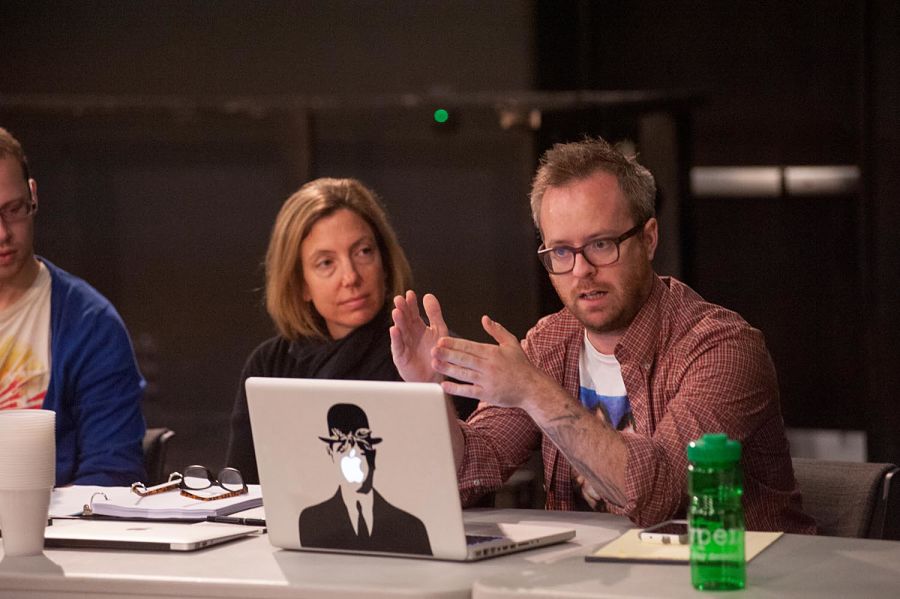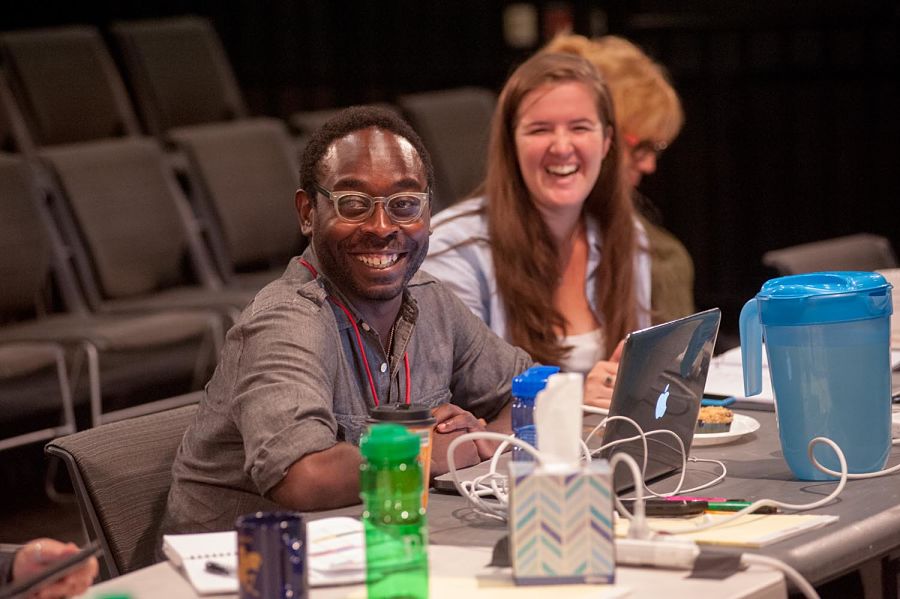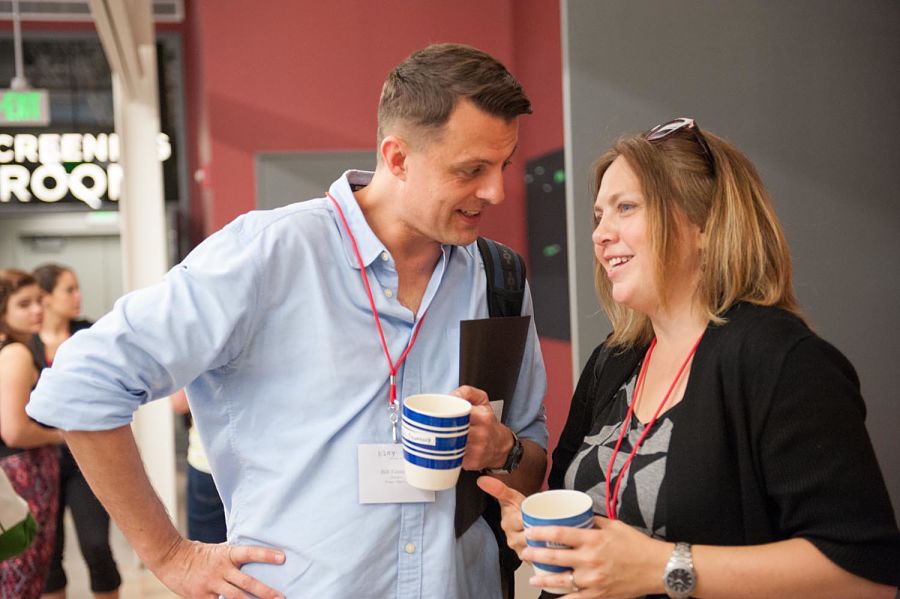PHILADELPHIA: In the lobby of a theatre on Drexel University’s sprawling campus, 77 theatre pros ate pizza.
Michele Volansky stood on a chair and addressed directors, dramaturgs, designers, and actors who, over the next two weeks, would help six playwrights develop their new plays.
“Welcome—but it’s not about you!” said the cofounder of PlayPenn, a new-play development hub, now in its 10th year. “Thank you for entering into this with generosity and humility, but the work of the playwright is primary here.”
If the air attendees were breathing felt thinner, it’s because they’d ascended to what insiders call “development heaven”—a.k.a., PlayPenn’s New Play Development Conference 2015, which began on July 7 and runs through July 26.
Every summer for two and a half weeks, PlayPenn is kicked off by a three-day retreat for playwrights, dramaturgs, directors, and designers. The convening goes on to feature free public readings of plays by six playwrights whose work is developed as part of the event, as well as readings of two other plays in process. These presentations take place in the middle of the conference, and again at the end. All readings adhere to Actors’ Equity Association’s staged reading contract meaning: no sets, props, costumes, or wigs. This year’s playwrights are J.T. Rogers, David J. Jacobi, Eric Pfeffinger, Ellen Struve, Genne Murphy, and James Ijames.
PlayPenn was born 11 years ago, when actor and director Paul Meshejian saw a void in the Philadelphia theatre scene. There were many great plays being produced in the city, but relatively little new work was getting made there. Taking his cues from the Playwrights’ Center in Minneapolis, where Meshejian had worked, he founded PlayPenn with Volansky.
After hearing stories of development hell—Meshejian cringes visibly at the term—from friends like playwright Lee Blessing, Meshejian wanted to create the opposite. “Here we offer playwrights respite from the pressures of daily life,” said Meshejian. “We’ll feed you, provide lodging, so you don’t have to worry—you can just write your play.”
And personal touches can make all the difference. Intern Patrick Ross color-coordinated the coffee mugs for each of the six plays, and was thus able to direct attendees: “If you want to hear more about J.T. Rogers’s Oslo, follow anyone carrying a light blue coffee mug, chosen to invoke the colors of the Israeli flag.”
A Draft of a Document
Rogers has worked with PlayPenn since its infancy. In 2005, he was a young father with a new baby, working 9 to 5 as a copy editor and struggling to make the rent. He came to PlayPenn, locked himself in a room, and didn’t come out until he had a complete draft. He left with The Overwhelming. Both this and his Blood and Gifts, also developed at PlayPenn, went on to be produced at London’s National Theatre. He has a very simple reason for coming back.
“At PlayPenn, I am in charge,” said Rogers. “The institution is not developing the play—I am.”
Before we arrived at a rehearsal reading of his play Oslo, we were warned by Meshejian: “The worst question to ask a playwright at PlayPenn is, ‘What is your play about?’ Because at this point, they have no idea. Everything is subject to change.”
As it now stands, Oslo revolves around the real-life husband-and-wife team Terje Larsen and Mona Juul, diplomats who conceived the Oslo “channel” in 1993, which led to direct peace talks between Yasser Arafat and Yitzhak Rabin, leaders of Palestine and Israel.
Written for 17 actors, Oslo details the 14 secret meetings held in Norway before the public rapprochement. It describes a peace process that is still has not been resolved, in its way a fitting metaphor for PlayPenn. As with Larsen and Juul, the goal at PlayPenn is just to produce workable draft of an important document.

Desert Father
Attendees could follow the black mugs—black like the black widow spiders that infest Widower—and meet David J. Jacobi, fresh out of the MFA playwriting program at University of California, San Diego.
Sitting at a table with his collaborators, Jacobi gave some background.
“In 2012, I wrote this as a 10-minute scene about a father and son in a house in the Las Palmas desert, inspired by David Foster Wallace’s novel Infinite Jest and my childhood obsession with professional wrestling,” Jacobi recalled. “It was the first thing that ‘wowed’ me and led me to the theatre.”
Someone asked Jacobi how the PlayPenn process made him feel, and he responded, “I feel taken care of.”
To be taken care of is exactly what Jonas, the 12-year-old boy at the center of Jacobi’s bleakly witty play, needs when he arrives at his coke-fiend father’s house in the New Mexican desert in search of a hero. Instead he finds solace in the riotously bright world of professional wrestling on TV.
Transplant Sylvania
If you spied the royal blue mugs and you’d meet Eric Pfeffinger, whose Human Error is set in Sylvania, Ohio, a suburb of Toledo. In the well-made plays of the 19th and early 20th century, doctors often served as fonts of knowledge, mouthing the philosophy of the playwright and fixing the play’s problems, and then the curtain would fall. The opposite is true in this play: Pfeffinger’s Dr. Hoskins is a goofball who accidentally implants Madeline’s embryo in a stranger named Heather. “Oops,” he says.
Like flipping between NPR and Fox News, Pfeffinger pits NRA-loving conservatives against liberal yogis in the fertility clinic mix-up that follows. “My play is about people who cocoon themselves in their own limited worldview, and can they change?” he said.
During a roundtable rehearsal reading, actor Steven Rishard stopped, stumped by a word. “Michigander? Do people really call themselves ‘Michiganders’?”
“ Yes, ‘Michigander’ is a word,” Pfeffinger replied. A glossary may be required for coastal audiences.
Steamboat Max
Blue-and-white-striped mugs hinted at the cheeky historical tone of Ellen Struve’s Prince Max’s Trewly Awful Trip to the Desolat Interior. To give some idea of this rambunctious, anachronistic collage, we defer to notes in a recent draft:
“This was an actual trip from 1832-1834 [when] Prince Maximilian du Weid traveled to the interior of America to observe the imperiled tribes along the Missouri. He brought along the Swiss artist Karl Bodmer…their journey, fueled by Dunkin Donuts coffee, includes steamboat karaoke and talking caged bears.”
After a rehearsal reading, Struve revealed that she “grew up in Omaha, Neb., near the Joslyn Art Museum, where Prince Maximilian’s journals are part of the museum’s permanent collection. “
So it’s partly geographical destiny that Prince Max serves as Struve’s hero. But note: Like Jacklyn Backhaus’s recent Men With Boats, another play inspired by 19th-century American explorers, Struve insists that Max and Bodmer be played by women.
Larger Than
If you found the watermelon mugs, you’d meet Philly native Genne Murphy, who’s about to enroll in Yale Drama School, and her magical-realist Giantess, about a young woman named Dee so devoted to caring for her frail grandmother that she forgets about herself…until a 30-foot girl strides into her life.
Riot grrrl power was palpable in the rehearsal read. Actor Aubie Merrylees, the only man in the room, noted, “I may not have felt before what it feels like to be ‘other,’ or the minority in the room.”
“Giantess is only my second full-length play, “ Murphy noted. “And it has a Philly 215 area code. This is my first time at PlayPenn, and I am here at just the right time. Surrounded by all these brilliant collaborators, my play becomes larger than me.”

Queer Brown Body
If you kept your eyes on the white mugs you’d catch St. Diana Ross the Boss flooded in a blue light in James Ijames’ White. In this modern-day Frankenstein/Pygmalion story, a talented African-American actress auditions for a white man starving for fame in the cutthroat art world.
Ijames addressed the essence of the play in the discussion following a rehearsal table read. “At the top of PlayPenn, we went to the Barnes Foundation Museum, and I was looking at all the classical ivory-white bodies on the canvases surrounding me,” Ijames said. “I thought, ‘Where does my queer brown body fit up there?’”
While leaving PlayPenn on the El train after a reading, the actress playing the lead in White, Joniece Abbot-Pratt, told me, “It’s a funny play, but then it’s not.” At this, she mimed choking herself, and then added, “It’s rare to have a playwright like James, who writes what I think, you know?”
PlayPenn’s curtain speech is always the same—Meshejian or Volansky read it off a piece of paper, but they could probably recite by heart by now. One line never fails to thrill, as it captures the amorphous nature of PlayPenn so acutely: “What you have seen here are mere snapshots of six plays at this point in time as they continue evolving toward the plays they will become.”


